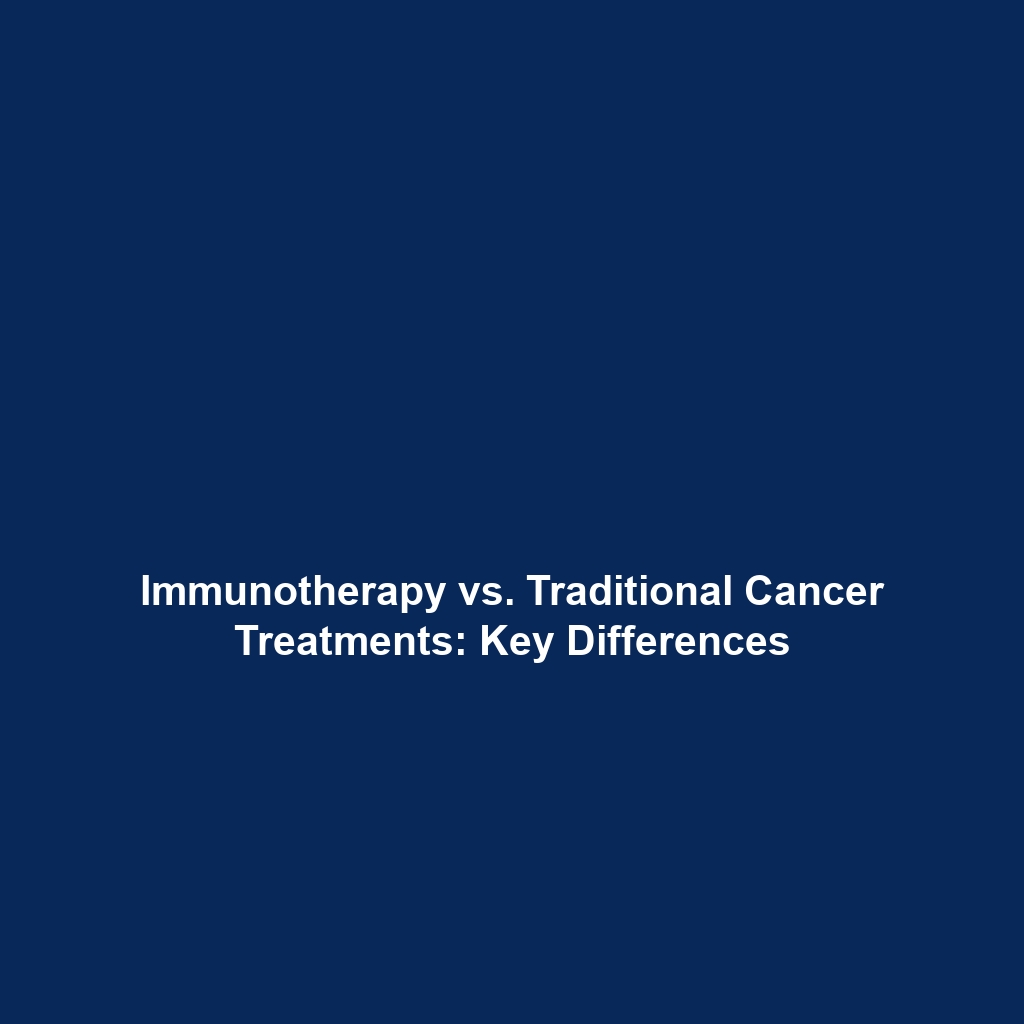Differences between Immunotherapy and Traditional Cancer Treatments (Chemotherapy, Radiation)
Introduction
Cancer treatment has evolved dramatically over the years, leading to the development of diverse therapeutic approaches. Among these, immunotherapy has gained significant attention for its innovative method of harnessing the body’s immune system to fight cancer. Unlike traditional cancer treatments such as chemotherapy and radiation, which target rapidly dividing cells indiscriminately, immunotherapy aims to enhance the immune response specifically against cancer cells. Understanding the differences between immunotherapy and traditional cancer treatments is crucial for patients and healthcare providers alike, shaping treatment decisions and improving outcomes.
Key Concepts
The understanding of cancer treatment involves several key concepts:
- Mechanism of Action: Chemotherapy uses drugs to destroy fast-growing cancer cells, affecting healthy cells in the process. Radiation therapy employs high-energy rays to target and obliterate cancer cells. In contrast, immunotherapy boosts or restores the immune system’s ability to detect and eradicate cancer cells.
- Target Specificity: Traditional treatments often lack specificity, leading to various side effects. Immunotherapy is designed to be more selective, targeting only cancerous cells while sparing normal cells.
- Side Effects: While chemotherapy and radiation can cause fatigue, nausea, and hair loss, immunotherapy may lead to immune-related adverse events, which can be different in nature and require specific management.
Applications and Real-World Uses
Immunotherapy has been successfully integrated into cancer treatment protocols in various ways, exemplifying its applications:
- Monoclonal Antibodies: These are engineered proteins that can target specific antigens on cancer cells. For instance, trastuzumab is used for HER2-positive breast cancer.
- Checkpoint Inhibitors: Drugs that inhibit proteins preventing immune response, such as pembrolizumab and nivolumab, have transformed the treatment landscape for melanoma and lung cancer.
- Cancer Vaccines: Vaccines like the one for prostate cancer are tailored to trigger the immune system against cancer cells, thereby providing a preventive approach to treatment.
Current Challenges
Despite the advancements in understanding the differences between immunotherapy and traditional cancer treatments, several challenges persist:
- Patient Selection: Identifying the right candidates for immunotherapy can be complex, as not all patients respond similarly.
- Cost and Accessibility: Immunotherapy treatments can be significantly more expensive, raising concerns about their accessibility for many patients.
- Resistance Mechanisms: Some cancers can develop resistance to immunotherapeutic agents, complicating treatment efficacy.
Future Research and Innovations
Ongoing research is focused on overcoming existing barriers related to the differences between immunotherapy and traditional cancer treatments. Upcoming innovations include:
- Combination Therapies: Research is exploring the synergistic potential of combining immunotherapy with chemotherapy or targeted therapies to improve overall effectiveness.
- Personalized Medicine: Advancements in genomics and proteomics will enable more tailored treatment options based on individual patient profiles.
- Next-Generation Therapies: Techniques such as CAR T-cell therapy are showing promise in treating solid tumors after initial success in blood cancers.
Conclusion
Understanding the differences between immunotherapy and traditional cancer treatments, such as chemotherapy and radiation, is essential for improving cancer treatment protocols. As research continues to evolve, the integration of innovative therapies could offer new hope for patients globally. For more detailed information about cancer treatment options, consider exploring our sections on Chemotherapy, Radiation Therapy, and Immunotherapy.

Leave a Reply